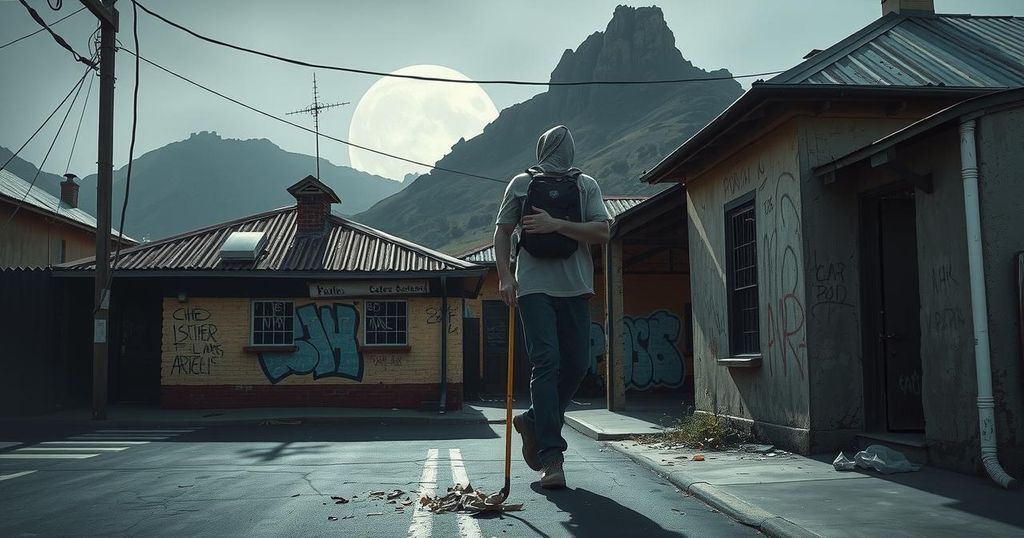Crime
AFRICA, CAPE, CAPE FLATS, CYRIL RAMAPHOSA, DA, DAVIN, DEVON, DEVON AFRICA, FAMILY, GARETH NEWHAM, GOFUNDME, HUMAN INTEREST, INSTITUTE FOR SECURITY STUDIES, JESUS, JOHANNESBURG, JUSTICE AND VIOLENCE PREVENTION PROGRAMME, KELLY AMBER, MURDER, SOUTH AFRICA, UND, UNDEAN, VIOLENCE, WESTERN CAPE
Michael Grant
0 Comments
South Africa’s Gang Warfare: The Victims Caught in the Crossfire in Cape Town
Cape Town’s gang wars continue to claim innocent lives, with families like the Africas suffering immense tragedies. Despite government efforts to curb violence, the roots of gang culture and drug economies loom large. Community leaders like Pastor Engel work tirelessly to mediate conflicts and provide hope for change, but many residents remain skeptical of external help, calling for local resilience instead.
In Cape Town, the daunting specter of gang violence looms large, impacting innocent lives and disrupting communities. Tucked away in the Cape Flats, Devon Africa recounts the horrific day his four-year-old son, Davin, was shot dead amidst a shootout between criminals. Also lost was Davin’s older sister, Kelly Amber, who died two years prior, at just 12, in a similarly tragic incident. Such violence seems persistent, with the police’s promises of increased patrols proving ineffective.
The numbers are alarming. The Western Cape, where the Cape Flats are located, accounts for a staggering proportion of South Africa’s gang-related murders. Despite various government initiatives, including the establishment of a special anti-gang unit by President Cyril Ramaphosa in 2018, the bloodshed continues. “There’s a whole history and generations of people who have been born into these gangs,” says Gareth Newham, head of the Justice and Violence Prevention programme at the Institute for Security Studies in Johannesburg. This deep-rooted gang culture is often fueled by desperation and social neglect, with gangs filling in for a failing state.
Communities such as Wesbank and Hanover Park bear the brunt. In Hanover Park, Pastor Craven Engel works tirelessly to mediate gang rivalries in the hopes of restoring peace. He argues that the drug economy is the primary driver behind much of the violence. “The bulk of the economy comes out of the drug culture. That’s the biggest economy,” Engel explains. Indeed, generational trauma stemming from apartheid acts as a catalyst, perpetuating a cycle of addiction and violence.
Every day, shootings and stabbings are common in these areas, usually involving young perpetrators or victims. The police cannot simply arrest one gang member and eliminate the problem; it creates a cycle of retaliation with younger members waiting to step into the power vacuum left behind. “How does a kid get shot seven times in his head?” Engel asks, highlighting the senseless brutality throughout the region.
Pastor Engel’s approach includes reaching out to both community members and gang leaders to negotiate peace. He balances his role as a pastor with managing dire situations in his community, making calls to warring factions. One gang boss even threatened him from prison, highlighting the contentious dynamics he faces. “If I want something to happen, then it still happens,” said the gang leader during one of their phone conversations.
Despite challenges, some individuals yearn for a way out, like Fernando “Nando” Johnston, a member of the Mongrels gang. He expresses a desire to change his course in life with Pastor Engel’s assistance. “In this game, there are only two options–go to jail or die,” Nando explains. Now, he is ready to join a rehabilitation program funded by donations, showing a glimmer of hope.
“You can now start building yourself up again,” Pastor Engel tells Nando. “You’ll be able to get a job and make money for yourself.” Yet, family dynamics complicate these choices; Nando’s mother, Angeline April, fiercely hopes he seizes this chance, stating, “Please just make the best of this opportunity, Nando.”
Despite Nando’s progress in the rehabilitation program, other families, like Devon and Undean’s, remain in despair. The aftermath of violence and retaliation has left them grappling with unbearable loss. Community sentiments reflect a lack of faith in law enforcement. Newham notes, “People do not know if the police will actually come if called.”
Pastor Engel emphasizes that the solution lies within the community itself rather than external forces. He concludes, “Nobody is going to come from anywhere to help or save us… politics has clearly failed us.” This plea for self-determination underlines the urgent need for resilience amid overwhelming odds in the Cape Flats.
Cape Town’s Cape Flats region is ensnared in a troubling legacy of gang violence, with innocent lives caught in the crossfire. Tragic stories, like those of Devon Africa’s family, highlight the human cost behind the statistics. Efforts by individuals like Pastor Engel illustrate a grassroots response to a deeply entrenched problem that hasn’t seen resolution despite governmental promises. As communities navigate despair and hopelessness, the call for change resonates—emphasizing the need for internal resilience, for those affected by the turmoil.
Original Source: www.bbc.com




Post Comment